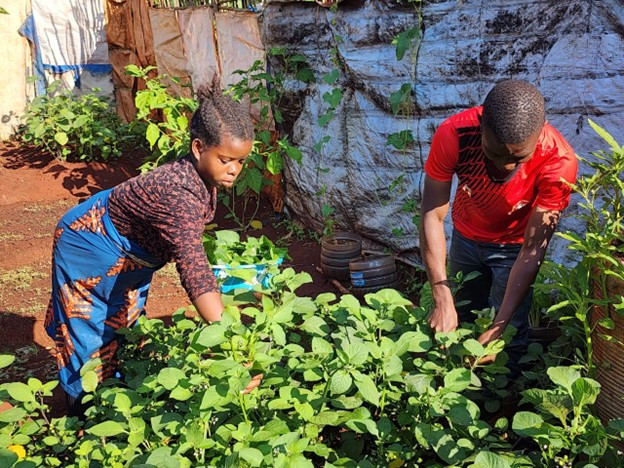Maria Bahati, a young refugee in Tanzania’s Nyarugusu Camp, transformed her family’s future through CWS’s WEZESHA Project—overcoming gender barriers, gaining farming skills, and inspiring her husband and community to embrace gender equality. Her journey highlights how empowerment and collaboration can lead to lasting change.
Breaking Barriers: Maria’s First Steps Toward Empowerment
Forced to flee her home at a young age, 20-year-old Maria Bahati navigated a new life in Tanzania with her husband and their child. Life was safe, but the family still faced many challenges in the Nyarugusu Refugee Camp, and Maria thought tirelessly of ways to help her husband put food on the table for their family.
Unfortunately, like many women in her community, Maria struggled to find opportunities to participate in income-generating activities outside of the household, and at first, her husband encouraged her to care for their family at home.
Then, in 2024, Maria joined CWS’s WEZESHA Project (meaning “empower” in Kiswahili), which supports communities in the Nyarugusu Refugee Camp with improving food security, nutrition and gender equality for farming families. Though her husband initially did not support her participation, Maria found discreet ways to attend training sessions with the quiet support of her fellow farmers.
Through the program, Maria learned sustainable farming techniques, seed production nutrition practices and communication skills to engage her husband in gender discussions. Using real-life examples, she showed him how families benefited when men and women worked together. Slowly, his perspective began to change. Eventually, her husband not only supported her participation but also encouraged her farming activities.
Leading by Example: Maria’s Impact on Her Community
As Maria’s knowledge and confidence grew, she became a beacon of hope for other women in her community. She shared the lessons she had learned, showing how gender equality could transform families. With her husband’s support, they worked together to improve their farm, her husband helped in household and soon, other women followed her example, using their new skills to enhance their own families’ lives. Her journey proved that when both men and women collaborate, they can create lasting change and uplift their families.
Today, their farm provides a steady income and nutritious food for their family. Maria Bahati now raises their family in a home where equality and collaboration are valued. She said, “At first, my husband resisted, but I remained firm. Over time, he saw the benefits and changed his mind. Now, we work as a team, and our farm sustains us. He even encourages other men to support their wives. This project has completely changed our lives.”
Maria’s journey is a testament to the power of education, perseverance and gender equality in transforming lives and building stronger communities.
We would like to thank our partners, the Canadian Foodgrains Bank and the Primate’s World Relief and Development Fund for allowing this assistance to be possible. You can learn about our programs in Tanzania here.








